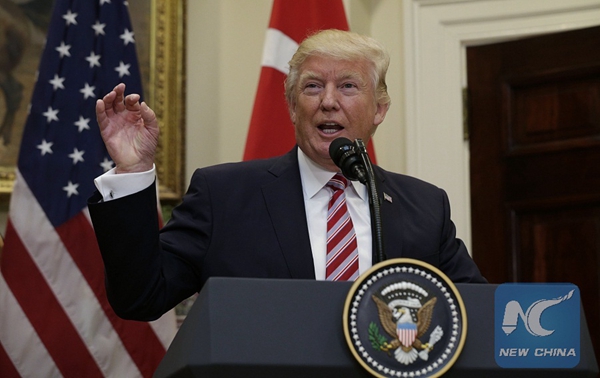Trump seeks return to political polarization in Gulf rift
- By Haifa Said
 0 Comment(s)
0 Comment(s) Print
Print E-mail China.org.cn, June 17, 2017
E-mail China.org.cn, June 17, 2017
|
|
|
U.S. President Donald Trump speaks to the media in the Roosevelt Room of the White House after meeting with Turkey's President Recep Tayyip Erdogan in Washington, U.S. May 16, 2017. [Photo/Xinhua] |
Tensions between Qatar and Gulf Arab neighbors have grown apace in recent years as part of a struggle for regional leadership. In the wake of the "Arab Spring in 2011," Qatar has embraced Islamist movements in the region including the Muslim Brotherhood, against the wishes of key player Saudi Arabia and its ally, the UAE. Qatar has also sought to warm up relations with Iran, Riyadh's arch-rival.
The recent Arab-Islamic-U.S. summit in the Saudi capital was a turning point in the most accurate sense of the word and the before-and-after formula lies perfectly here.
President Trump's dubbing of his visit to Saudi Arabia as "historic," and the description of the understanding document between him and King Salman bin Abdulaziz Al-Saud as "unprecedented," according to Saudi Foreign Minister Adel al-Jubeir at a press conference with his American counterpart Rex Tillerson in Riyadh on May 20, emanate from a preconceived idea of what the Trump visit would produce.
After the visit, the Saudi regime speedily reviewed its regional relations on the basis of reproducing the classic American policies in the Middle East that prevailed during the cold war era.
Contrary to former presidents from Bill Clinton to Barack Obama, Trump seems to be in full readiness to revitalize the strategic partnership with the regional allies, encompassing sharp political alignments and adoption of the allies' conceptions of the region's future shape, and essentially return to the logic of political polarization.
In his speech in Saudi Arabia, Trump said "Qatar, which hosts the U.S. Central Command, is a crucial strategic partner," trying to keep an intentional policy balance.
However, two striking tweets by him later said it all:
"During my recent trip to the Middle East I stated that there can no longer be any funding of Radical Ideology. Leaders pointed to Qatar - look! "[Saudi Arabia and its allies] said they would take a hard line on funding. ... ...extremism, and all reference was pointing to Qatar. Perhaps this will be the beginning of the end to the horror of terrorism!"
From a Saudi perspective, Trump's visit provided an implicit mandate and tutelage to the Kingdom to administer and lead regional policy.
However, Trump's siding with Saudi Arabia is not as smooth as it seems on the surface. There are two issues involved: fighting terrorism on one hand, and the deftness of trade negotiating and creating money on the other hand. These are two aims that, if not attained, add two more cards in the hands of the impeachment team facing the president with several complementary investigations underway.
Trump has got little evidence on show to attest the aptitude of alliance with Saudi Arabia, at a time when remonstrations are rising in the capitals of international decision-making, demanding a halt to Saudi Arabia's extremist ideology from sweeping into the Western societies and jeopardizing their domestic security and peace.
The Saudi and Emirati accusations that Qatar is "supporting" terrorism are of a regressive nature, as Qatar's embrace of extremist religious groups is not a unilateral policy, but it has been and still is part of a universal U.S.-European-regional (Turkish-Saudi-Qatari) project.
As a result, it is not a war between angels and demons, but one for guardianship under American patronage.
Regardless of the timeframe that might emerge in the Gulf crisis, Saudi Arabia and the UAE is seeking to impose a role function on Qatar; for the moment, that falls short of creating a large-scale war with Iran, where the recent terrorist attacks were seen as implementation of a threat by Saudi Defense Minister Mohammed bin Salman Al Saud to move the battle to Iran.
This has drawn attention to an alleged relationship between ISIS and Al Saud. In that case, we could be entering a new chapter of proxy wars again, where the West would have to choose between fighting terrorism or going to war with Iran.
However, the U.S. might not want to go so far in inflaming tensions between the Gulf States as it has 10,000 troops at al-Udeid base near Doha, its largest military base in the region. Qatar bears the full financial cost of this American presence on its land. It would cost Washington much time and money to move these troops to Saudi Arabia or Abu Dhabi.
When examining U.S. goals in general, what always comes to mind is that it is really seeking to promote a policy of fragmentation and hegemony, using local tools. While it seems that there are attempts to breathe life into the old regional system, the Trump administration's policy, as always, seems fraught with uncertainty.
Haifa Said is chief editor of Syria Arab News Agency.
Opinion articles reflect the views of their authors, not necessarily those of China.org.cn.







Go to Forum >>0 Comment(s)